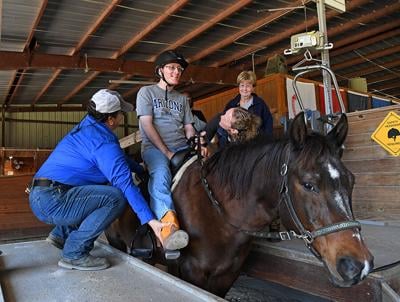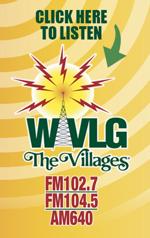In a quiet hospital room, Judy Reilly sits in a chair next to the bed, waiting for a nurse to take her to a physical therapy session.
To her surprise, a miniature horse walks in instead.
Reilly, of Leesburg, breaks into a grin when she sees Dumpling the mini horse, followed by handler Mary Rose Gullet, founder of Honey’s Mini Therapy Adventures.
These therapy visits are much more than just petting animals. Animal therapy is proven to improve people’s health and attitude.
According to a 2020 study published in the Journal of Patient Experience, 15 minutes of interaction with an animal can raise the body’s levels of oxytocin and dopamine, two chemicals responsible for positive moods. Levels increase for a protein that boosts your immune system, and the stress hormone cortisol also lowers after interacting with pets.
Equine therapy is just one type of animal-assisted therapy that can improve physical and mental health and reduce stress. The Central Florida area is home to several different organizations that provide different types of animal therapy.
Bonding Therapy
Honey’s Mini Therapy Adventures, based in south Sumter County, is an equine therapy organization that works in clinical settings. It includes 15 horses that visit hospitals, psychiatric units, rehabilitation centers and memory care facilities.
Gullet founded the 501(c)(3) in 2018 and has a master’s degree in social work. During graduate school she focused on equine therapy.
She said people can’t help but relax as they interact with the horses.
“Patients respond well,” Gullet said. “You meet them in such a vulnerable place, but the horses are not judgmental, they are just there to love you. Every place is important, but a hospital is the Olympics for therapy animals.”
When Gullet took Dumpling to UF Health The Villages Hospital in February, everyone’s mood noticeably lifted.
“This happens every time we come here and I never get tired of it,” Gullet said. “Beyond the novelty of having a mini horse inside the hospital, people are just happy to see her.”
Reilly quietly pet Dumpling’s black coat while talking to Gullet.
“She reminds me of my own horse I had as a girl,” Reilly said. “His name was Pal and he was all black with four white feet.”
Danielle Cerna and her mother, Lynda Cerna, are a big reason the nonprofit visits the hospital. Danielle is on the board of directors at Honey’s and is preparing to graduate with a degree in psychology, while Lynda works at the hospital.
Lynda said at the beginning of the pandemic, stress levels among hospital staffers were the highest she ever had seen them.
“Having the horses come, at first, it was for the staff,” Lynda said. “There was an immediate change when everyone interacted with the horses and we knew things were for the better after.”
Gullet said the horses visit as many patients as possible in the span of a few hours.
Marie Aguiar, of the Village of Caroline, had a room filled with family members, but she only had eyes for Dumpling once she spotted her.
Dumpling slowly navigated around equipment before laying her head in Aguiar’s lap. Aguiar’s mouth opened in a grin and she started to play with Dumpling’s mane, braiding the hair in front and tucking it behind her ear.
Equine therapy is popular in Florida, with four nonprofits located near The Villages. Gentle Carousel Miniature Horse Therapy was founded 27 years ago, said Debbie Garcia-Bengochea, education director of the organization.
“There are a lot of equine therapy programs that people can go to for riding and other therapy,” she said. “But there were no programs where the therapy came to you.”
Gentle Carousel is based in Ocala, but the horses travel all over the country to help people. In February, a few horses went to Parkland for the annual memorial for those killed in the Marjory Stoneman Douglas High School shooting. They also were asked to provide therapy in Connecticut after the shooting at Sandy Hook Elementary School in 2012.
“We were there for the first time the students saw each other again,” Garcia-Bengochea said. “We know that it makes a difference to have animal therapy present during stressful moments.”
Riding Therapy
For a more active type of equine therapy, some nonprofits provide riding lessons.
Marion Therapeutic Riding Association in Ocala has provided equine therapy for more than 40 years. Horse therapy helps with physical, mental, emotional and intellectual disabilities and disadvantages, said Jenna Rovira, development director.
“Riding on a horse is similar to our own gait when we walk,” Rovira said. “You sway and move with the horse and form a connection, which helps with emotional regulation as well as mobility.”
MTRA is a member of Professional Association of Therapeutic Horsemanship International and is a PATH International Premier Accredited Center.
The volunteers at the facility say working with people during riding sessions makes them feel good, too.
Mackenzie Robbins is a volunteer at MTRA, but she started as a rider. Robbins has cerebral palsy, a condition that impacts movement and coordination.
Robbins started riding at 6 years old to help with core strength and balance. Because she didn’t worry about tripping or falling while riding, she grew more confident and stronger.
Riding the horses also put her in a good mood, she said, and she wanted to pass along that feeling by volunteering.
Riding therapy is growing in popularity. As of 2020, there were 5,424 certified instructors, an increase from 4,776 in 2017, according to PATH.
The Horses with a Mission nonprofit formed in Groveland in 2019. It provides therapeutic riding lessons as well as therapy reading with their horse, Woody.
Mickey Hollis, volunteer coordinator, said watching riders change over the course of their lessons is one of her favorite parts of her job.
“Some people can be real timid at first, but after a few rides, they open up,” she said. “Sometimes all it takes is one lesson and they are grinning from ear to ear by the time they climb off.”
Founder Vicki D’Angelo volunteered with a horse therapy program in New York before relocating to Florida. She fell in love with combining her love of horses with helping others, and eventually earned her PATH certification.
“Horses are such gentle, emotional animals,” she said. “They can tell when someone needs them.”
Pet Therapy
For animal therapy of a smaller variety, the Love for a Lifetime program with Sheltering Hands in Ocala has you covered.
The program, originally called Senior for Senior, places senior cats with senior adults to combat loneliness.
Robert Vass, director of outreach and development, said just under 100 cats are currently in the program.
“Earlier in the year we were able to place all of them, and then take in a few more,” Vass said. “It was a great feeling.”
Vass said the program has proven to be incredibly helpful for older adults who are struggling with loneliness, depression or just a lack of motivational drive.
“A lot of older adults lose their drive and feel like they have less of a purpose,” Vass said. “When they have a cat in their lives, it injects a sense of purpose into their heart again.”
Another reason Vass said the program is helpful for participants is because it is a foster program. All cats have to be at least 8 years old, and they are returned to Sheltering Hands when their foster parent is no longer able to care for them.
“Sometimes people are afraid to adopt animals because they don’t know what will happen to their cat when they die,” Vass said. “With Love for a Lifetime, they come right back with us.”
The Dynamic Dog Club of The Villages has 85 active, certified handler-dog duos that visit places around the community to brighten people’s days.
“We’ve got 25 teams that do it at the hospital,” member Carmen Tedrick said. “The teams go to 20 different local facilities, not including the schools and libraries.”
Club members are passionate about dogs and want to spread their happiness to others, club president Cheryl Williams said. Their work is more important than even they may realize.
“There is empirical data showing a direct, positive impact of animal therapy on humans,” said Jennifer Dobkin, a registered veterinary technician and the manager of the People-Animal Connection program at UCLA Health. “Numerous studies have demonstrated benefits such as reduced stress, improved mood, lowered blood pressure, decreased anxiety, increased social interaction, and enhanced overall well-being in various populations.”
The UCLA People-Animal Connection includes about 65 teams that do therapy work, and the volunteer handlers spend four to six months preparing their dogs before they are ready to work in a hospital, Dobkin said.
“They are the most wonderful group of people. They’re humans that want to make a difference in someone’s life,” she said. “Their purpose and reason for doing the work is pretty incredible.”
The Dynamic Dog Club also has teams certified with Reading Education Assistance Dogs, a program in which they take their dogs to schools so children can read aloud to them, helping to build their confidence and improve their literacy.
Williams said the connection between the kids and dogs helps them open up.
“Kids love dogs, and they get excited to pet them and show off their books,” she said. “And the dogs just want to love them back and are so patient.”
The Dynamic Dog Club also has a drill team that visits facilities and clubs like Our Moment Cafe to perform and entertain.
Service Dog Therapy
The Dynamic Dog Club also is sponsoring two puppies that will be trained by Patriot Service Dogs, a local nonprofit that provides service dogs to veterans at no cost to the veteran.
Patriot Service Dogs is in its 15th year, and founder Julie Sanderson said dogs are given to veterans with PTSD, military sexual trauma, mobility issues, or generalized anxiety or depression.
“We have 18 dogs in training right now at various ages,” she said. “Four of them will be placed with veterans in the next two months.”
The National Center of PTSD estimates that 6% of the adult population will live with PTSD at some point in their lives. In 2020, around 13 million Americans had PTSD.
Service dogs help people with PTSD by providing deep pressure therapy during moments of anxiety and stress, and nudging or barking during traumatic flashbacks or nightmares.
Sanderson said it costs between $2,500 and $3,500 to cover the costs of raising a dog during its two years of training.
“We give all our dogs to veterans for free,” Sanderson said. “We do a lot of fundraising to make sure they never have to pay for one of our dogs.
Those service dogs can be literal lifesavers for their owners.
Miranda True, 22, was diagnosed with postural orthostatic tachycardia syndrome in 2019. Also called POTS, it causes dizziness, lightheadedness, and fainting as well as other symptoms.
True noticed symptoms while in high school. After lots of testing, she was diagnosed with POTS.
“The diagnosis didn’t really mean the fainting stopped, though,” she said. “That stopped when I got Harley.”
Harley is True’s 3-year-old West German show line shepherd who works as her medical alert service dog.
Harley is trained to detect the chemical changes in True’s scent when her blood pressure starts to drop and he alerts her up to 15 minutes before she feels anything, giving her time to take medicine if needed.
“When my POTS was really bad in the beginning, I was fainting four or five times a day, and you feel really bad for about an hour after each time,” True said. “Now I faint maybe once or twice a year thanks to Harley.”
There is no cure for POTS, but True can drink water or electrolyte drinks, or take salt tablets to raise her blood pressure.
“Before, with as many times as it was happening, I couldn’t really leave my house,” True said. “Having Harley gives me my independence back.”
When True is in public, Harley wears a working vest worn by most medical alert service dogs that details what bystanders should do if a handler gets sick.
“He’s a herding dog and will find someone else around me,” True said. “He’s pretty persistent too, so he bumps people in the back of the knees.”
True said people should know that if they see a service dog in public without its handler, they should follow the dog to provide assistance.
Harley is so good at his job, True said he even alerted her that someone else was having a low blood pressure spell. About six months ago while standing in a line at SeaWorld, Harley started alerting to True.
“I felt fine, and when I checked my blood pressure it was reading as normal,” True said. “Then he put his paw on the person in front of us, who I noticed had a cane.”
True said the stranger also had POTS, and was indeed experiencing low blood pressure. Harley could smell the chemical change in the person and knew what to do.
Service dogs like Harley also can be trained to alert diabetics to changes in blood sugar levels and alert those with seizure disorders to oncoming seizures.
Dogs also can work as guide dogs for people with visual impairments. Southeastern Guide Dogs is a nonprofit with volunteer puppy raisers in The Villages who train service dogs and guide dogs that assist their handlers with leading them, alerting to obstacles and grabbing items.
True is always impressed with how hard Harley wants to work.
“He knows what his job is,” True said. “I feel really lucky to have this guy.”
Senior writer Maddie Cutler can be reached at 352-753-1119, ext. 5386, or maddie.cutler@thevillagesmedia.com.








Commented
Sorry, there are no recent results for popular commented articles.